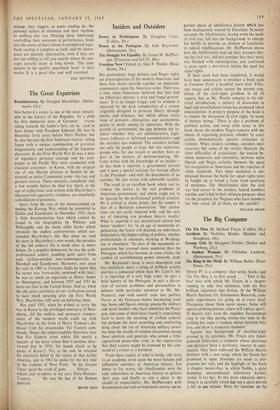Insiders and Outsiders
Power at the Pentagon. By Jack Raymond. (Heinemann, 50s.)
BIG government, huge defence and Negro rights are preoccupations of the modern American. and these four books provide together an important commentary upon the American scene, There was a time when Americans believed that they had (in Jefferson's phrase) 'a wise and frugal govern- ment.' It is no longer frugal, and its wisdom is obscured by the dark complexities of a system originally designed to preserve liberty through checks and balances, but which allows every form of pressure, obstruction and autonomous power to nestle among its interstices. With the growth of government, the gap between the in- siders—whether they are administrators, legis- lators, lobbyists or informed commentators—and the outsiders has widened. The outsiders include not only the people at large, but also numerous groups who, for one reason or another, have no part in the process of decision-making. Mr. Cater writes with the knowledge of an insider— he has been a reporter, a government servant and is now a special assistant for foreign affairs to the President—and with the detachment of an outsider. He also writes with admirable lucidity.
The result is an excellent book which can in- troduce the novice to the real problems of American government, and which ought not to be ignored by the professional political scientist. He is critical at many points, but his temper is that of a Burkeian conservative. 'Our institu- tions are not easily tinkered with, and the very act of tinkering can produce bizarre results.' What is required is not institutional reform but better 'insiders'; for 'in an age of mammoth or- ganisation, the future still depends on individuals dedicated to this higher calling of politics, whether professionals or amateurs, working in Washing- ton or elsewhere.' No part of the mammoth or- ganisation has aroused more suspicion than the Pentagon, which has become, in some circles, the symbol of overwhelming power unwisely used.
Mr. Raymond's book is more descriptive and less analytical, more a string of brilliant articles and less a connected wh'ole than Mr. Cater's; but it is reporting of a very high order. In part a brief history of the Pentagon, in part a discus- sion of current problems and personalities in defence (with particular attention to Mr. Mc- Namara), and with several raids into politics, Power at the Pentagon makes fascinating read- ing. Some odd figures emerge among the military and naval insiders who have inhabited the Penta- gon, and some of them have found it surprisingly hard to learn the meaning of civilian control;
but perhaps the most surprising and comforting thing about the rise of American military power
has been the wealth of wisdom discovered among these admirals and generals, who joined a little- appreciated peace-time army in the expectation that their careers might be crowned by the com- mand of a cruiser or a battalion.
From these studies of what is inside, orte turns to an academic work upon the most famous and influential outsiders in American history. For better or for worse, the Abolitionists were the only subversives in American history to achieve their aims and finally to win a place in the citadel of respectability. Mr. McPherson's well- documented and well-written book surveys an im-
portant phase of abolitionist history which has been inadequately treated by historians. In, many accounts the Abolitionists, having sown the seeds of civil war, fall into the background, to emerge but briefly to provide an element of fanaticism in radical republicanism. Mr. McPherson shows how the Abolitionists kept up their pressure dur- ing the civil war, did not consider that their work was finished with emancipation, and continued to press upon a war-weary nation the need for equal rights.
If their work had been completed, it would have been unnecessary to produce a book such as Freedom Now! a hundred years later. Fifty- one essays and articles survey the present cort. dition of the civil-rights problem in all it aspects, but, as Mr. Westin remarks in his edi- torial introduction, a century of discussion in legal and constitutional terms has produced token emancipation. A primary purpose of the book is to reopen the discussion of civil rights 'in terms of human beings.' There is also a problem of political action, and essay after essay in this book shows the modern Negro concern with the means of organising pressure, whether by court action, demonstration, passive resistance or violence. When insiders combine, outsiders must associate, but some of the writers illustrate the inner difficulties of association: the tension be- tween moderates and extremists, between white liberals and Negro activists, between the quest for recognition as Americans and the rejection of- white standards. This inner weakness is em- phasised because the battle for equal rights must be fought on so broad a front from positions of weakness. The Abolitionists after the civil war had access to the insiders, lacked numbers outside, and failed in their ultimate purpose; what are the prospects\ for Negroes who have numbers but who stand, all of them, on the outside?
WILLIAM 'BROCK






































 Previous page
Previous page